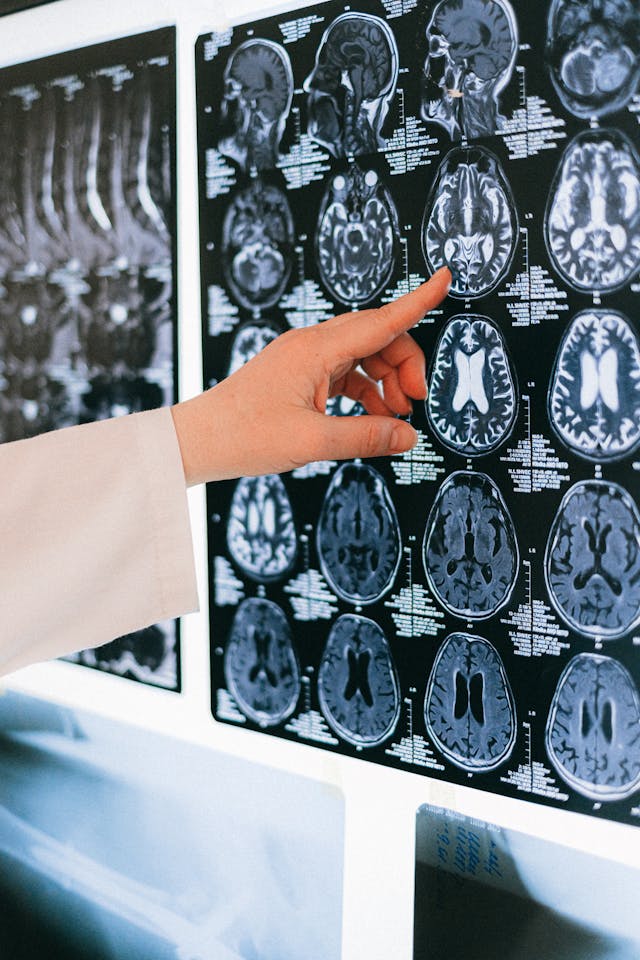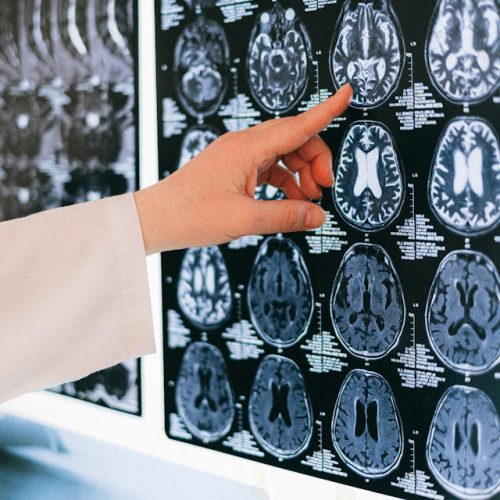What is the Pituitary Gland?
The pituitary gland, often referred to as the “master gland,” is a small, pea-sized gland located at the base of the brain, just below the hypothalamus. It is housed in a bony structure called the sella turcica. The pituitary gland plays a crucial role in regulating a wide range of bodily functions by secreting various hormones into the bloodstream. It is divided into two main parts: the anterior pituitary (adenohypophysis) and the posterior pituitary (neurohypophysis), each responsible for producing different hormones.
Function and Benefits
The pituitary gland is integral to maintaining homeostasis in the body by regulating critical physiological processes through hormone production. Each lobe of the pituitary gland produces specific hormones with distinct functions:
Anterior Pituitary (Adenohypophysis)
- Growth Hormone (GH): Stimulates growth, cell reproduction, and cell regeneration. It is essential for normal physical growth in children and maintaining muscle and bone mass in adults.
- Thyroid-Stimulating Hormone (TSH): Stimulates the thyroid gland to produce thyroid hormones (T3 and T4), which regulate metabolism, energy levels, and overall growth and development.
- Adrenocorticotropic Hormone (ACTH): Stimulates the adrenal glands to produce cortisol, a hormone that helps the body respond to stress, maintain blood sugar levels, and regulate metabolism.
- Prolactin (PRL): Promotes milk production in breastfeeding women and influences reproductive health and immune system regulation.
- Follicle-Stimulating Hormone (FSH) and Luteinizing Hormone (LH): Regulate the reproductive processes, including the menstrual cycle in women and sperm production in men.
FSH stimulates the growth of ovarian follicles in women and spermatogenesis in men, while LH triggers ovulation in women and testosterone production in men.
Posterior Pituitary (Neurohypophysis)
- Antidiuretic Hormone (ADH or Vasopressin): Regulates water balance in the body by controlling the amount of water reabsorbed by the kidneys, thus maintaining blood pressure and fluid balance.
- Oxytocin: Plays a crucial role in childbirth and lactation by stimulating uterine contractions during labor and promoting milk ejection during breastfeeding. It also influences social bonding and behavior.
How The Pituitary Gland Benefits Us
The pituitary gland’s hormones are vital for the proper functioning of various organs and systems throughout the body. Its regulatory functions ensure that critical processes such as growth, metabolism, stress response, reproduction, and water balance are properly maintained.
By coordinating these processes, the pituitary gland helps the body adapt to changing conditions and maintain overall health and well-being.
Overall, the pituitary gland is a key player in the endocrine system, acting as a central hub that directs and coordinates the activity of other glands and organs. Its ability to produce and release hormones ensures that the body’s internal environment remains stable and capable of responding to internal and external changes effectively.
Types of Pituitary Disorders
1. Pituitary Tumors
- Non-Functioning Pituitary Tumors: These tumors do not secrete hormones but can cause symptoms due to their size and mass effect on surrounding structures.
- Functioning Pituitary Tumors: These tumors secrete hormones excessively, leading to specific symptoms based on the hormone involved:
- Prolactinomas: Overproduction of prolactin, leading to infertility, irregular menstrual cycles, and lactation in non-pregnant individuals.
- Acromegaly: Excess growth hormone production in adults, causing enlargement of hands, feet, and facial features, as well as metabolic disturbances.
- Cushing’s Disease: Excess production of adrenocorticotropic hormone (ACTH), leading to cortisol overproduction and symptoms such as weight gain, high blood pressure, and mood changes.
- Thyrotropinoma: Rare tumors that produce thyroid-stimulating hormone (TSH), leading to hyperthyroidism.
2. Hypopituitarism
- Deficiency of Pituitary Hormones: Hypopituitarism can result from pituitary tumors, surgery, radiation therapy, or other causes, leading to insufficient production of one or more hormones:
- Adrenocorticotropic Hormone (ACTH) Deficiency: Causes adrenal insufficiency.
- Growth Hormone (GH) Deficiency: Impairs growth and metabolism.
- Thyroid-Stimulating Hormone (TSH) Deficiency: Causes hypothyroidism.
- Luteinizing Hormone (LH) and Follicle-Stimulating Hormone (FSH) Deficiency: Affects reproductive function.
3. Pituitary Apoplexy
- Sudden Bleeding or Infarction: Pituitary apoplexy occurs when there is sudden bleeding or loss of blood flow to the pituitary gland, often associated with severe headache, visual disturbances, and hormonal deficiencies.
4. Diabetes Insipidus
- ADH Deficiency: Diabetes insipidus results from inadequate secretion of antidiuretic hormone (ADH), causing excessive urination and thirst.
5. Rathke’s Cleft Cyst
- Non-Tumor Cyst: Rathke’s cleft cysts are fluid-filled cysts that develop from remnants of Rathke’s pouch during embryonic development, sometimes causing symptoms due to their size or compression.
6. Central Diabetes Insipidus
- ADH Deficiency: Central diabetes insipidus results from the inability of the hypothalamus or pituitary gland to produce or release sufficient ADH.
Signs of Pituitary Gland Dysfunction
Pituitary gland dysfunction can manifest through a variety of signs and symptoms, reflecting its pivotal role in regulating numerous body functions. Here is an in-depth look at the signs of pituitary gland dysfunction:
Hormonal Imbalances
- Growth Hormone Deficiency or Excess
- Deficiency: In children, this can result in stunted growth and delayed puberty. In adults, symptoms may include increased body fat, decreased muscle mass, reduced bone density, and fatigue.
- Excess: Overproduction can lead to conditions such as acromegaly in adults, characterized by abnormal growth of the hands, feet, and facial features. In children, it can cause gigantism, leading to excessive height and growth rates.
- Thyroid-Stimulating Hormone (TSH) Imbalance
- Deficiency (Hypothyroidism): Symptoms include fatigue, weight gain, cold intolerance, constipation, dry skin, hair loss, and depression.
- Excess (Hyperthyroidism): Symptoms can include weight loss, rapid heartbeat, heat intolerance, sweating, tremors, anxiety, and irritability.
- Adrenocorticotropic Hormone (ACTH) Imbalance
- Deficiency (Adrenal Insufficiency): Symptoms include chronic fatigue, muscle weakness, loss of appetite, weight loss, low blood pressure, and depression.
- Excess (Cushing’s Syndrome): Symptoms include weight gain, particularly around the abdomen and face, high blood pressure, purple stretch marks, thinning skin, and mood changes such as irritability and depression.
- Prolactin Imbalance
- Excess (Hyperprolactinemia): In women, this can cause irregular menstrual cycles, infertility, and milk production unrelated to childbirth or breastfeeding. In men, it can lead to decreased libido, erectile dysfunction, and infertility.
- Luteinizing Hormone (LH) and Follicle-Stimulating Hormone (FSH) Imbalance
- Deficiency: In women, this can result in irregular menstrual cycles, infertility, and symptoms of menopause. In men, it can lead to low testosterone levels, decreased libido, erectile dysfunction, and infertility.
Physical Signs
- Headaches: Persistent or severe headaches can occur due to the pressure exerted by a pituitary tumor on surrounding brain structures.
- Vision Problems: The pituitary gland is located near the optic nerves, and a tumor or growth can press on these nerves, leading to vision issues such as double vision, loss of peripheral vision, or sudden blindness.
Psychological and Emotional Symptoms
- Mood Changes: Hormonal imbalances can lead to significant mood changes, including depression, anxiety, irritability, and mood swings.
- Cognitive Impairment: Individuals may experience difficulties with concentration, memory, and mental clarity.
Physical Changes
- Unexplained Weight Changes: Significant weight gain or loss without changes in diet or exercise can be a sign of hormonal imbalance.
- Changes in Bone Density and Muscle Mass: Osteoporosis, fractures, and muscle weakness can indicate growth hormone deficiency or excess.
- Changes in Skin and Hair: Dry, thinning skin, hair loss, and changes in hair texture can be signs of thyroid hormone imbalances.
Reproductive Issues
- Infertility: Both men and women can experience infertility due to imbalances in LH, FSH, or prolactin levels.
- Sexual Dysfunction: Decreased libido, erectile dysfunction in men, and menstrual irregularities in women are common.
Metabolic Issues
- Fatigue and Weakness: Chronic tiredness and muscle weakness are often reported by individuals with pituitary dysfunction.
- Altered Metabolism: Abnormal lipid and glucose metabolism can lead to increased cholesterol levels and insulin resistance.
Causes of Pituitary Gland Dysfunction
Pituitary gland dysfunction can arise from various causes, leading to disruptions in hormone production and regulation. Here’s an in-depth exploration of the factors contributing to pituitary gland dysfunction:
1. Pituitary Tumors
- Non-Functioning Pituitary Adenomas: These tumors do not produce hormones but can grow and compress surrounding pituitary tissue, leading to hormone deficiencies due to impaired gland function.
- Functioning Pituitary Adenomas: Tumors that produce excess hormones such as prolactin (causing hyperprolactinemia), growth hormone (causing acromegaly or gigantism), ACTH (causing Cushing’s syndrome), or TSH (causing hyperthyroidism).
2. Pituitary Surgery or Radiation
- Surgical removal of a pituitary tumor or radiation therapy aimed at shrinking tumors can sometimes damage healthy pituitary tissue, leading to hormone deficiencies.
3. Head Trauma
- Severe head injuries or trauma to the head can damage the pituitary gland directly or disrupt the blood supply to the gland, resulting in pituitary dysfunction.
4. Infections and Inflammatory Conditions
- Infections such as meningitis or tuberculosis can affect the pituitary gland, leading to inflammation (hypophysitis) and subsequent hormone deficiencies.
- Autoimmune conditions like autoimmune hypophysitis can cause the immune system to attack the pituitary gland, impairing its function.
5. Genetic Factors
- Genetic mutations or inherited conditions can predispose individuals to pituitary gland disorders, such as familial pituitary adenomas or genetic syndromes affecting hormone production.
6. Vascular Disorders
- Conditions affecting blood flow to the pituitary gland, such as pituitary apoplexy (sudden hemorrhage or infarction of the pituitary gland), can result in acute hormone deficiencies.
7. Medications
- Certain medications, such as long-term use of corticosteroids, can suppress pituitary function and lead to hormone imbalances.
8. Hormonal Changes
- Pregnancy, childbirth, and menopause can temporarily affect pituitary function due to hormonal fluctuations, although these changes are usually transient.
9. Unknown Causes
- In some cases, pituitary gland dysfunction may occur without an identifiable cause, termed idiopathic pituitary dysfunction.
Diagnosis of Pituitary Gland Dysfunction
Diagnosing pituitary gland dysfunction involves a comprehensive approach that includes clinical assessment, laboratory tests, imaging studies, and sometimes specialized hormone stimulation tests. Here’s a detailed overview of the diagnostic process:
1. Clinical Assessment
- Medical History: A thorough review of the patient’s medical history, including symptoms suggestive of hormone imbalances or pituitary disorders.
- Physical Examination: Examination for signs of hormone deficiencies or excesses, such as changes in body composition, skin changes, and neurological deficits.
2. Laboratory Tests
- Hormone Levels: Blood tests to measure levels of various hormones produced by the pituitary gland and target organs:
- Thyroid Hormones: TSH, free T4, and free T3.
- Adrenal Hormones: ACTH, cortisol.
- Reproductive Hormones: FSH, LH, testosterone, estrogen, progesterone.
- Growth Hormone: IGF-1 (insulin-like growth factor 1).
- Prolactin: Levels may be elevated in prolactinomas.
- Stimulation Tests: Specialized tests to assess hormone response to stimulation, such as insulin tolerance test (for growth hormone) or ACTH stimulation test (for adrenal function).
3. Imaging Studies
- MRI (Magnetic Resonance Imaging): Imaging of the pituitary gland to visualize tumors, structural abnormalities, or changes indicative of pituitary dysfunction. Contrast dye may be used to enhance visualization.
4. Visual Field Testing
- Perimetry: Assessment of visual fields to detect any compression or damage to the optic nerves by pituitary tumors (especially important in cases of large tumors).
5. Genetic Testing
- Genetic Screening: In cases suspected of genetic predisposition to pituitary disorders, genetic testing may be considered to identify specific mutations or syndromes.
6. Other Tests
- CSF Analysis: In cases of suspected pituitary infection or inflammation (hypophysitis), analysis of cerebrospinal fluid (CSF) may be performed.
- Bone Density Scan (DXA): Assessment of bone mineral density in patients with suspected growth hormone deficiency or excess.
7. Multidisciplinary Approach
- Collaboration: Diagnosis often involves a multidisciplinary team approach, including endocrinologists, neurosurgeons, radiologists, and sometimes geneticists, to ensure comprehensive evaluation and management.
Treatment Options
Treatment for pituitary gland dysfunction depends on the underlying cause and may include:
- Medications: Hormone replacement therapy to restore normal hormone levels.
- Surgery: To remove tumors or abnormal growths.
- Radiation Therapy: For tumors that cannot be surgically removed.
- Lifestyle Changes: Managing stress, maintaining a healthy diet, and regular exercise can support overall health and hormone balance.
Effectiveness of Treatments
- Medications: Effective in managing hormone deficiencies and restoring normal function.
- Surgery: Successful in removing tumors but may require hormone replacement therapy post-surgery.
- Radiation Therapy: Effective in shrinking tumors but may have long-term side effects.
Prevention of Pituitary Gland Dysfunction
While some causes of pituitary dysfunction cannot be prevented, you can take steps to reduce your risk:
- Avoid Head Injuries: Wear protective gear during sports and activities.
- Manage Stress: Practice stress-reduction techniques such as mindfulness and yoga.
- Regular Health Check-ups: Early detection of symptoms can lead to timely treatment.
Discussing Issues with Your Doctor
When discussing pituitary gland dysfunction and depression with your doctor:
- Be Honest: Share all symptoms, even if they seem unrelated.
- Ask Questions: Inquire about the potential link between pituitary dysfunction and depression.
- Request Tests: Ask for hormone level tests if you suspect pituitary issues.
- Discuss Treatment Options: Explore all available treatments and their implications.
Disclaimer
This article is for educational purposes only and is based on research. I am not a doctor or health advisor. Always consult with your primary care doctor before considering any of the information in this article.







